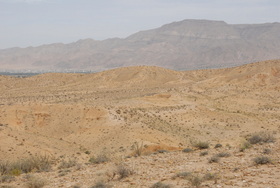
The road South to Kasserine ran through the dictionary definition of badlands. Despite occasional half-hearted showers, the ground remained angry and arid, with scratches of wiry esparto grass the only vegetation braving such an inhospitable environment. Dry wadis wandered between steep mesas, listless goats pretended they could make a living by lapping at stagnant pools and tearing up the memory of plants.
The scenery was dramatic, a post-apocalyptic Wild West, with glowering skies completing the look. The unhappy towns and single street villages we passed through completed the look: quite what people did out here remained mysterious, and houses seemed to sprout solely because two roads were crossing. The revolution grew in towns like these, anonymous and purposeless, much like their inhabitants. No jobs or support, but with a long history of Berber resistance to le pouvoir, stretching back to Roman times. If nature herself was that cruel a mistress, why would you put up with any crap from a master from some other world, a land of bounteous crops and fat livestock?
As you approach the Kasserine Pass, famous for being one of the most unhappy battles in World War II, some industry starts to pull itself together in an effort to give people something to do. Mostly it takes the form of turning esparto grass into something that people might actually want. Yet there is no reason to stick around in Kasserine itself, so on, always onwards, to Sbeitla, a short drive down the road, and home to a remarkably complete Roman town. The Arab town is strangely over-provided with places to eat, with ever more being built. Naturally, however, the quality restaurant that served alcohol had closed down. There appeared to be no reason why every street would be so stuffed with pizza joints and local eateries, but none of them seemed to be short of trade. I asked the man who sold tickets at the ruins if they got many tourists through, but he bemoaned the fact that they had stopped coming, and he could only rely on Allah to send them back.
The scenery was dramatic, a post-apocalyptic Wild West, with glowering skies completing the look. The unhappy towns and single street villages we passed through completed the look: quite what people did out here remained mysterious, and houses seemed to sprout solely because two roads were crossing. The revolution grew in towns like these, anonymous and purposeless, much like their inhabitants. No jobs or support, but with a long history of Berber resistance to le pouvoir, stretching back to Roman times. If nature herself was that cruel a mistress, why would you put up with any crap from a master from some other world, a land of bounteous crops and fat livestock?
As you approach the Kasserine Pass, famous for being one of the most unhappy battles in World War II, some industry starts to pull itself together in an effort to give people something to do. Mostly it takes the form of turning esparto grass into something that people might actually want. Yet there is no reason to stick around in Kasserine itself, so on, always onwards, to Sbeitla, a short drive down the road, and home to a remarkably complete Roman town. The Arab town is strangely over-provided with places to eat, with ever more being built. Naturally, however, the quality restaurant that served alcohol had closed down. There appeared to be no reason why every street would be so stuffed with pizza joints and local eateries, but none of them seemed to be short of trade. I asked the man who sold tickets at the ruins if they got many tourists through, but he bemoaned the fact that they had stopped coming, and he could only rely on Allah to send them back.

 RSS Feed
RSS Feed
